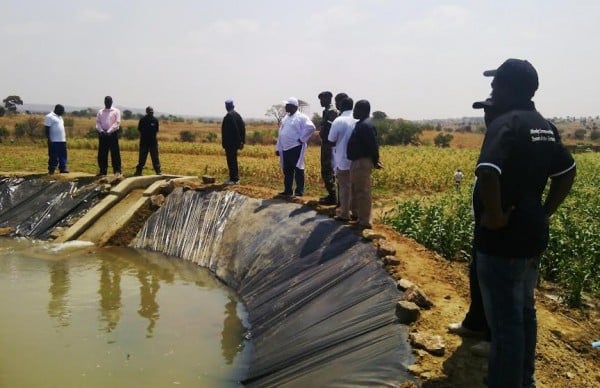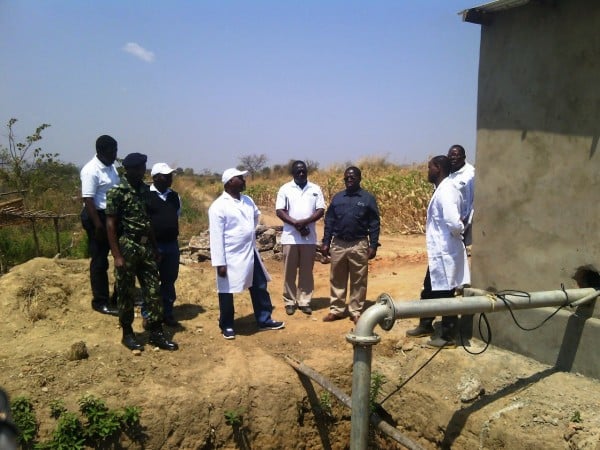![Chiyembekeza admiring to one of the dams being used at Thyolansanu farm - pic by Gladys Kamakanda]()
Government through the Ministry of Agriculture and Food Security says it is intensifying irrigation farming in the country in order to increase agriculture production and productivity.
[caption id="attachment_94537" align="alignright" width="600"]
![Chiyembekeza admiring to one of the dams being used at Thyolansanu farm - pic by Gladys Kamakanda]()
Chiyembekeza admiring to one of the dams being used at Thyolansanu farm - pic by Gladys Kamakanda[/caption]
[caption id="attachment_94538" align="alignright" width="600"]
![Minister of Agriculture Dr Allan Chiyembekeza (c) being briefed on the Solar-powered irrigation - pic by Gladys Kamakanda]()
Minister of Agriculture Dr Allan Chiyembekeza (c) being briefed on the Solar-powered irrigation - pic by Gladys Kamakanda[/caption]
This was disclosed by the minister responsible Dr Allan Chiyembekeza when he toured Thyolansanu Farm in in Namitete along Mchinji Road.
He said Malawi has been experiencing low crop production due to erratic rainfall patterns, dwindling water resources and other negative effects mainly caused by climate change. These factors are affecting national food security and the economy
“Government through the Ministry launched the National Irrigation Master Plan and Investment Framework. The Ministry has also revised the National Water Resources Master Plan which gives information on surface and groundwater availability,” said Chiyembekeza.
He said the Irrigation Master Plan and Investment plan provides guidance to all stakeholders in sustainable development and expansion of the irrigation sector over the coming 20 years (2015-2035).
Chiyembekeza explained that the plan highlights priority areas for development and investment; and, also arrangements for improved coordination in implementing irrigation programmes, management and capacity building.
He said the plan which is aimed at increasing the current area of 104 000 hectares by a total of 116 000 hectares is divided in three phases: Phase I (2015-2020), phase II (2021-2025) and Phase III (2026-2035) comprising approximately 20 000 hectares; 28 500 hectares; and 67500 hectares of new irrigation schemes, respectively.
“The total investment cost for the Plan is US$2.4 Billion. This comprises New Irrigation Development which will take US$1.1 Billion (46%); Irrigation management will take US$785 million; Capacity Building will take US$510 million; and, Coordination and Management will take US$21 million,” said Chiyembekeza.
He said implementation of the Plan requires good collaboration between and amongst various stakeholders in the irrigation sector in terms of resource mobilization and implementation.

 Chiyembekeza admiring to one of the dams being used at Thyolansanu farm - pic by Gladys Kamakanda[/caption]
[caption id="attachment_94538" align="alignright" width="600"]
Chiyembekeza admiring to one of the dams being used at Thyolansanu farm - pic by Gladys Kamakanda[/caption]
[caption id="attachment_94538" align="alignright" width="600"] Minister of Agriculture Dr Allan Chiyembekeza (c) being briefed on the Solar-powered irrigation - pic by Gladys Kamakanda[/caption]
This was disclosed by the minister responsible Dr Allan Chiyembekeza when he toured Thyolansanu Farm in in Namitete along Mchinji Road.
He said Malawi has been experiencing low crop production due to erratic rainfall patterns, dwindling water resources and other negative effects mainly caused by climate change. These factors are affecting national food security and the economy
“Government through the Ministry launched the National Irrigation Master Plan and Investment Framework. The Ministry has also revised the National Water Resources Master Plan which gives information on surface and groundwater availability,” said Chiyembekeza.
He said the Irrigation Master Plan and Investment plan provides guidance to all stakeholders in sustainable development and expansion of the irrigation sector over the coming 20 years (2015-2035).
Chiyembekeza explained that the plan highlights priority areas for development and investment; and, also arrangements for improved coordination in implementing irrigation programmes, management and capacity building.
He said the plan which is aimed at increasing the current area of 104 000 hectares by a total of 116 000 hectares is divided in three phases: Phase I (2015-2020), phase II (2021-2025) and Phase III (2026-2035) comprising approximately 20 000 hectares; 28 500 hectares; and 67500 hectares of new irrigation schemes, respectively.
“The total investment cost for the Plan is US$2.4 Billion. This comprises New Irrigation Development which will take US$1.1 Billion (46%); Irrigation management will take US$785 million; Capacity Building will take US$510 million; and, Coordination and Management will take US$21 million,” said Chiyembekeza.
He said implementation of the Plan requires good collaboration between and amongst various stakeholders in the irrigation sector in terms of resource mobilization and implementation.
Minister of Agriculture Dr Allan Chiyembekeza (c) being briefed on the Solar-powered irrigation - pic by Gladys Kamakanda[/caption]
This was disclosed by the minister responsible Dr Allan Chiyembekeza when he toured Thyolansanu Farm in in Namitete along Mchinji Road.
He said Malawi has been experiencing low crop production due to erratic rainfall patterns, dwindling water resources and other negative effects mainly caused by climate change. These factors are affecting national food security and the economy
“Government through the Ministry launched the National Irrigation Master Plan and Investment Framework. The Ministry has also revised the National Water Resources Master Plan which gives information on surface and groundwater availability,” said Chiyembekeza.
He said the Irrigation Master Plan and Investment plan provides guidance to all stakeholders in sustainable development and expansion of the irrigation sector over the coming 20 years (2015-2035).
Chiyembekeza explained that the plan highlights priority areas for development and investment; and, also arrangements for improved coordination in implementing irrigation programmes, management and capacity building.
He said the plan which is aimed at increasing the current area of 104 000 hectares by a total of 116 000 hectares is divided in three phases: Phase I (2015-2020), phase II (2021-2025) and Phase III (2026-2035) comprising approximately 20 000 hectares; 28 500 hectares; and 67500 hectares of new irrigation schemes, respectively.
“The total investment cost for the Plan is US$2.4 Billion. This comprises New Irrigation Development which will take US$1.1 Billion (46%); Irrigation management will take US$785 million; Capacity Building will take US$510 million; and, Coordination and Management will take US$21 million,” said Chiyembekeza.
He said implementation of the Plan requires good collaboration between and amongst various stakeholders in the irrigation sector in terms of resource mobilization and implementation.